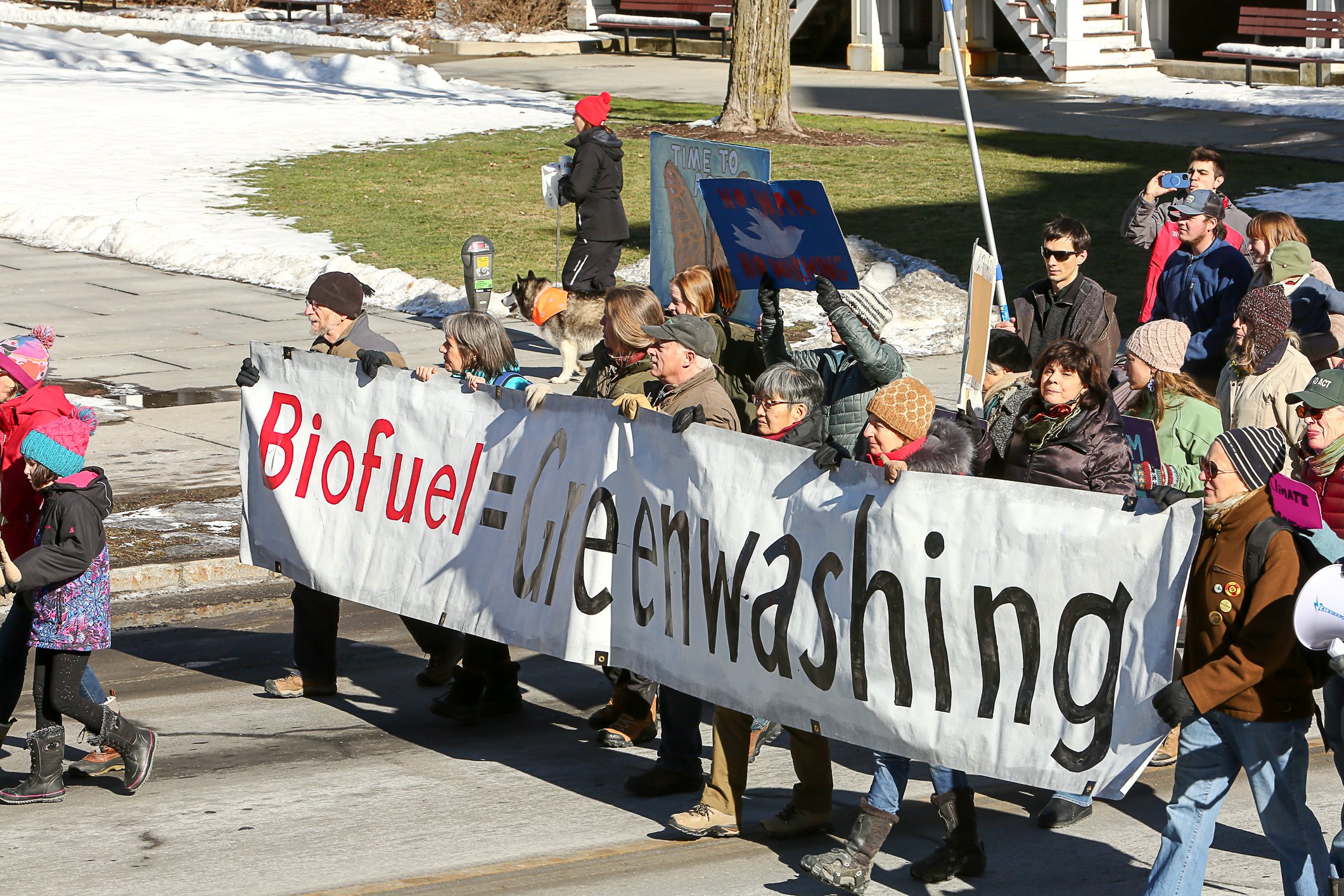Shut it Down: A coalition of Vermont residents unite to oppose the proposed expansion of the McNeil biomass plant
by 350VT Intern, Claire Greenburger
“[I] started to wonder what was going on, watching these loaders go around like little animals in the huge pile of chips,” says Vermonter Chris Gish, who lives a block away from the McNeil biomass plant in Burlington’s Old North End. After Gish moved to the Old North End, he “started just watching [the plant] every night from the Overlook at the edge of Manhattan drive.” It quickly sparked his curiosity. Upon further investigation into the environmental impacts of the plant, Gish, like many other Vermonters, has grown concerned.
A ten-foot-high barbed wire fence encloses the McNeil Generating Station. Within its bounds, stands a nine-story baby blue building, routinely encircled by trucks and tractors. Every hour, 76 tons of wood chips are hauled inside the plant and burned in flames. Steam billows ominously from the plant into the surrounding environment, accompanied by an incessant, high-pitched whistle and drawn-out electronic beeps.
The McNeil Generating Station began operations in 1984. Though the plant was created with the intent of diversifying fuel sources, today, Burlington Electric Department claims that biomass is a zero-emission alternative to fossil fuels, critical to the state's attempts to transition from fossil fuels to cleaner energy sources. The troubling reality is that forests are the only tried and true systems that remove carbon dioxide from the atmosphere. Burning trees for electricity not only releases more carbon dioxide per unit of energy produced than burning fossil fuels, but it also incentivizes the cutting of forests, removing carbon sinks and destroying biodiversity. The McNeil plant has also contributed to worsening environmental conditions in the Old North End, emitting harmful pollutants into the surrounding environment, which pose a threat to the health of one of Vermont’s poorest and most racially diverse communities in the state.
The McNeil Generating Station in Burlington, VT. Source: Seven Days, 2018. Photographer: James Buck.
To meet the McNeil plant’s high operational costs, Burlington Electric Department and the Vermont Utilities have become dependent on Renewable Energy Credits (RECs) to keep the plant afloat. “The reason McNeil runs at all is because it generates renewable energy certificates as it generates electricity,” says Peter Duval, who worked on the 1992 low-temperature district energy project proposed by Burlington District Energy Corporation. “In the New England region, electrical utilities participate in the business of exchanging environmental attributes. In some states, regulations for this trading process assume — wrongly — that burning biomass is zero emission, comparable to solar or wind energy.” In 2019, RECs constituted 35% of McNeil’s revenue.
Burlington’s Net Zero Roadmap sets the goal of reaching Net Zero Energy by 2030. It has been considered one of the most aggressive municipal climate plans in the country. The plan, however, omits two of Burlington’s largest sources of emissions: the McNeil biomass plant and the airport. “They’re cooking the books from the start,” says Gish.
In December of 2022, Vermonters growing concerns about state-wide greenwashing, along with the emergence of a decades old plan to expand the McNeil plant led to the beginning of Stop BTV Biomass. This coalition of local Burlington residents, which includes both Duval and Gish, are concerned that biomass, biofuels and ‘renewable’ natural gas are being promoted as solutions to the climate crisis. The group has united to oppose a new plan to expand McNeil by constructing a mile-long steam pipe that would supply heat to the UVM Hospital. The proposed project would cost an estimated 40 million dollars. Darren Springer, general manager of the Burlington Electric Department, told VTDigger that the project “would help to reduce annual carbon emissions by approximately 13,000 tons in the city.”
Stop BTV Biomass at the 02/11/23 Energy & Climate Justice Rally at the State House. Source: Stop BTV Biomass.
Stop BTV Biomass’ main concern with the steam pipe is that it would act as a justification for keeping the McNeil plant open long-term, despite its harmful environmental impacts. “If you connect this steam pipe, and then say, ‘McNeil is the critical steam supplier for the hospital,’ then that becomes the excuse to keep running McNeil all the time, which is exactly the wrong thing to do. The right thing to do is to shut it down and go about the business of making sure every new building is super insulated and requires no heat,” says Duval.
The 2023 proposed “Burlington district energy system”, which is a steam transmission line connecting McNeil to UVMMC.
“It will incent the plant staying open for decades,” says Gish. “The only reason the city is so interested in it is because of the faulty rules around ‘renewable energy.’” The steam pipe will allow McNeil to qualify for additional thermal RECs, which would be traded via a local scheme enabled by Town Meeting Day Ballot Question 2 and S.5, The Affordable Heat Act.
The Affordable Heat Act (AHA), which is currently under consideration in the legislature, supports biomass as a heating fuel alternative. The AHA would require fossil fuel dealers to earn so-called clean heat credits by switching their fuel supply over time from fossil fuels to approved alternatives. As written, the AHA would award McNeil clean heat credits: “It doesn't accurately account for biogenic emissions and all the kind of associated lifecycle effects from doing something like cutting forests or growing crops to make fuel,” explains Gish.
“The incentive to transition to carbon intensive and polluting fuels like wood, biofuels and renewable natural gas is appearing in so many places that we are deeply concerned about the direction we are heading as a state,” reports Stop Biomass.
350Vermont is advocating for a revised AHA, which would disqualify liquid biofuels, renewable natural gas, biomass, and hydrogen from earning clean heat credits, allowing for more accurate emissions counting that would effectively transition us away from all combustion fuels for heating.
Disqualifying biomass from the ‘renewable’ classification would likely be the downfall of McNeil, as has been the case with other biomass plants in the region. ReEnergy Black River biomass power facility, located in Fort Drum, New York, is set to close this spring because New York no longer considers biomass to be renewable, and the plant is unable to stay open without the subsidy provided by RECs. "McNeil should have been shut down long ago, like its contemporary Midland SECO. Stored Solar Ryegate, ReEnergy Black River, and other wood chip plants are in trouble and closing because they are simply too expensive to operate in a competitive energy market. McNeil is kept on life support with REC subsidies. Those subsidies are disappearing and are widely opposed by environmental groups," says Duval.
Stop Biomass believes in the importance of education campaigns to raise awareness and educate the public about the plant. “I think there is a major lack of understanding,” says Gish. “I think people in power have been steeped in the purported environmental benefits of McNeil for a really long time.” Gish believes in exposing these mainstream climate solutions for what they really are, a “kind of desperate, neoliberal attempt to fit climate action within our existing unsustainable economic system.”
On March 7th, Burlington voted on Ballot Question 2, which asked voters to allow the City to impose a fee on certain buildings that install fossil fuel rather than renewable heating for the stated purpose of reducing greenhouse gas emissions. The bill failed to inform voters that systems fueled by wood are considered “renewable.” The majority of people voted “Yes,” and the bill passed. Not all hope is lost, according to Stop Biomass: the city council still has to make the bill into an ordinance, which provides the opportunity for the council to bring the question back before voters about whether to put an impact fee on biomass, liquid biofuels, and renewable natural gas. It is critical that Burlington residents contact their city councilors to express their concerns about the Carbon Impact Fee and to state their opposition to the McNeil expansion. opposition to the McNeil expansion.
“Burlington ratepayers do not benefit [from the steam pipe]. Their energy efficiency charge is being siphoned off to fund the development of this project. So they're already losing money on it,” says Duval. It is in the best interest of Vermonters and the future viability of our environment that this plan be put to a stop.
Gish hopes the movement to stop the steam pipe expansion project will act “as a window, ultimately working to decommission McNeil.”
Protesters at the 350Vermont 2023 Energy & Climate Justice Rally on February 11th, 2023. Photographer: Fritz Seftleber.




